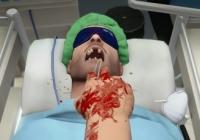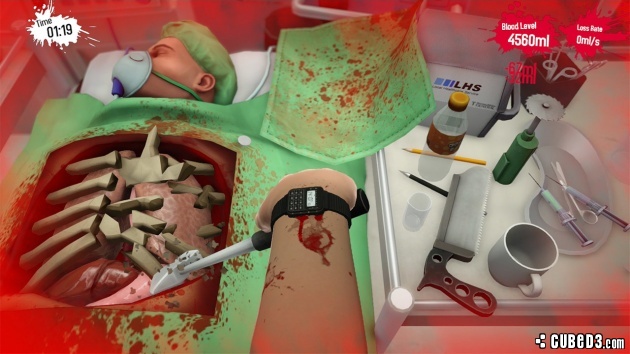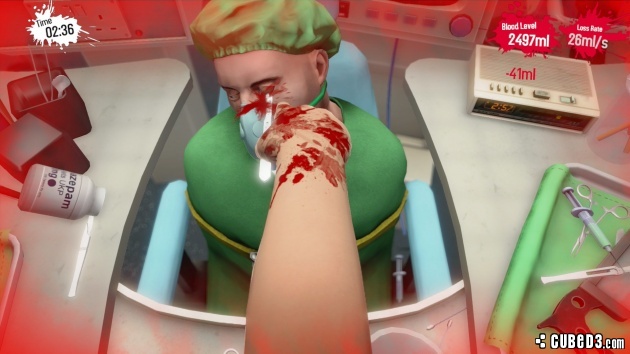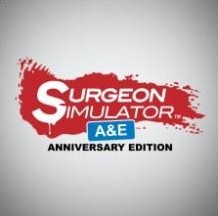Surgeon Simulator: Anniversary Edition (PlayStation 4) Review
By Coller Entragian  12.09.2014
12.09.2014

Being a surgeon is a daunting task. About 20 years of school, having to be on call 24 hours a day and the sheer concentration required to perform some of the most delicate and careful procedures where one mistake will cost the life of a patient. It becomes quite a surprise when Surgeon Simulator casts the player as a one-armed man who is so pudgy his watch sometimes pops off his wrist - also he may have been stricken with cerebral palsy. Surgeon Simulator is a hard game, but it is also a silly novelty game that isn't about the player's mastery of the controls and systems in the core mechanics but mostly about absurd physics and intentionally counterintuitive controls.
Just by the way Surgeon Simulator begins, it is obvious that this is not a serious or realistic simulation game. The Trauma Center games are some of the premiere surgeon games out there, and they also have a high difficulty like Surgeon Simulator but, unlike Surgeon Simulator, they are games that punish players for making poor choices rather than cripple them with counterintuitive controls and goofy physics. In Surgeon Simulator the player controls only one hand and the instruments are laid out around the patient. The game would have almost no challenge if players could just intuitively pick up the required instrument and perform the surgery while not making a mess or accidently getting pricked by a needle and getting drugged. No, the point of Surgeon Simulator is that is has bad controls - it is the whole selling point of the game and what separates it from Trauma Center.

Surgeon Simulator proudly advertises that it is built with the Unity engine. It is an okay looking game, blandly textured and often looking a tad like from the stock archive. The bland aesthetics are definitely intentional, meant to evoke a sterile hospital feeling. The retro 80s beats do the experience justice and are actually pretty great musical cues. There are some visually interesting flourishes in Surgeon Simulator, one of which is in the hardest level of the game, which involves a procedure in zero gravity, with all the instruments wafting about. If simply picking up instruments was hard enough, doing it in a zero-G environment becomes the ultimate test of accuracy and mastery of hand-eye coordination.
While Bossa Studios' game may be one of the toughest games on the PlayStation 4, it is arbitrarily difficult. Even when the player has a complete understanding of the controls and systems in the mechanics of the game, there are quite a few issues that gamers will be at the mercy of. Clipping that can confuse or obstruct the field of view, or inconsistent physics that can be very erratic and can make it so a procedure is impossible to complete because a vital instrument's physics got glitched out and fell through geometry are both present, unfortunately. There are many randomised factors that play into Surgeon Simulator that are supposed to be part of the game's quirky and absurd charm, but this begs the question of does a game become good because it succeeds at being intentionally bad? A game that is trying to be ironic says that the developer is using faults and stupid game design choices as a shield from criticism, by using the old adage "It's supposed to be bad."

Cubed3 Rating
Subpar
Like other novelty joke games, Surgeon Simulator: Anniversary Edition will eventually fall into obscurity and be forgotten. It is a game that doesn't try to offer legitimate challenge, but rather is a gimmicky tech demo for Unity's physics engine and effects. While the game is amusing at times, it gets old really fast. Too many technical anomalies and unintentional randomised factors can make some attempts unplayable. However, it is legitimately satisfying when able to complete a procedure or accomplish a manoeuvre, thanks, of course, to the gratitude felt when the game does not throw-up all over itself.

![]() 4/10
4/10
![]() 0
(0 Votes)
0
(0 Votes)
 Out now
Out now  Out now
Out now  None
None  Out now
Out now Comments
Comments are currently disabled

 Sign In
Sign In Game Details
Game Details Subscribe to this topic
Subscribe to this topic Features
Features





 Top
Top

